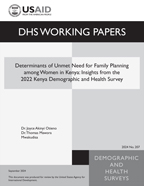- PUBLICATIONS
- JOURNAL ARTICLES
- ACCESS PUBLICATIONS
Publications Summary
- Document Type
- Working Papers
- Publication Topic(s)
- Family Planning
- Country(s)
- Kenya
- Survey
- Kenya DHS, 2022
- Language
- English
- Recommended Citation
- Otieno, Joyce Akinyi, and Thomas Mawora Mwakudisa. 2024. Determinants of Unmet Need for Family Planning among Women in Kenya: Insights from the 2022 Kenya Demographic and Health Survey. DHS Working Papers No. 207. Rockville, Maryland, USA: ICF.
- Download Citation
- RIS format / Text format / Endnote format
- Publication Date
- September 2024
- Publication ID
- WP207
Download
 Determinants of Unmet Need for Family Planning among Women in Kenya: Insights from the 2022 Kenya Demographic and Health Survey (PDF, 779K)
Determinants of Unmet Need for Family Planning among Women in Kenya: Insights from the 2022 Kenya Demographic and Health Survey (PDF, 779K)
Download this publication
There is no printed copy available to order.
